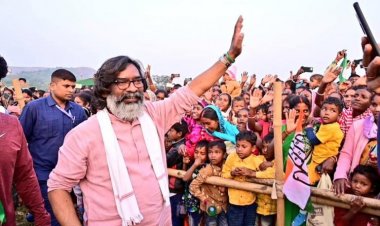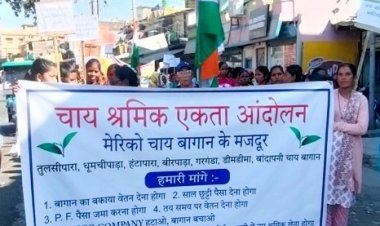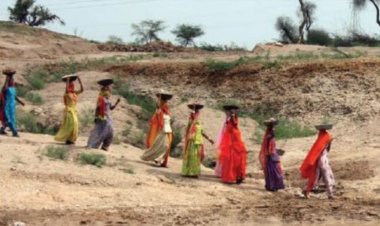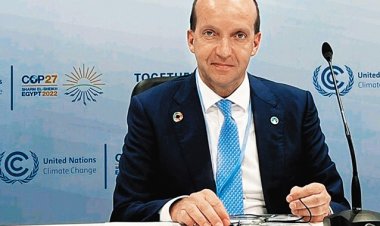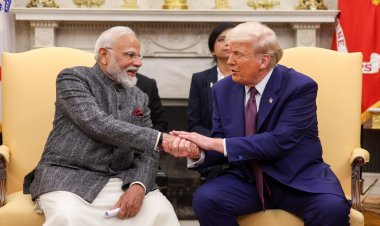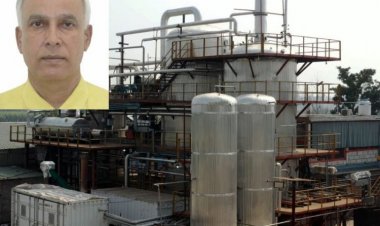UP turns BJP 's juggernaut upside down
Samajwadi Party and Congress, which have lost two consecutive assembly elections, are jointly defeating BJP on 44 seats in Uttar Pradesh, whereas BJP had set a target of winning 80 out of 80 seats here along with its allies. The way the Union Ministers have lost from Uttar Pradesh indicates that they had nothing to do with the ground issues. Also, only bulldozers and beneficiary facilities are not a guarantee of winning the election
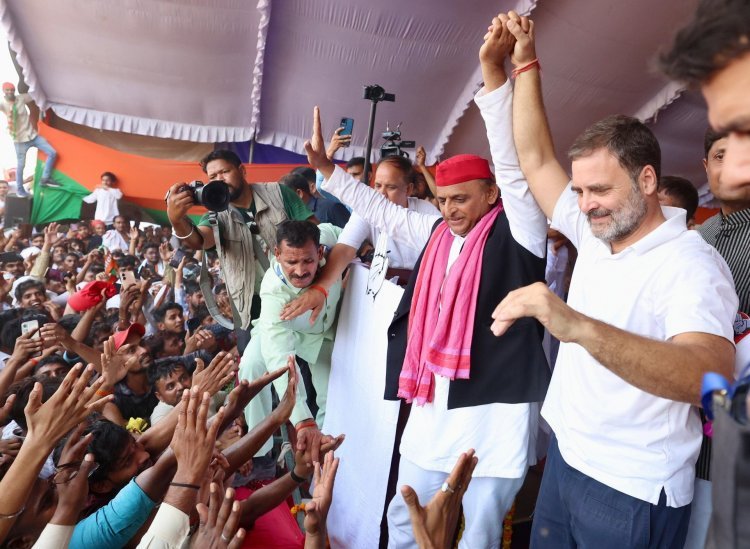
The latest figures of the counting of votes of the Lok Sabha elections are pointing towards a major political change in this election. Samajwadi Party and Congress, which have lost two consecutive assembly elections, are jointly defeating BJP on 44 seats in Uttar Pradesh, whereas BJP had set a target of winning 80 out of 80 seats here along with its allies. The way the Union Ministers have lost from Uttar Pradesh indicates that they had nothing to do with the ground issues. Also, only bulldozers and beneficiary facilities are not a guarantee of winning the election. Here, Akhilesh Yadav's PDA formula and Rahul Gandhi's Nyay have been successful in giving tough competition to Modi's guarantee and Modi Yogi's double engine government.
In 2014, the BJP found the way to power at the Centre from Uttar Pradesh. The BJP got the support of the atmosphere created by the Muzaffarnagar riots and the allegations of corruption against the Congress’ UPA government at the Centre. It is believed that the path to power at the Centre passes through Uttar Pradesh. This was the reason why Narendra Modi chose Varanasi as his second Lok Sabha seat as part of a major political strategy. This time too he has been elected to the Lok Sabha from Varanasi but his margin has decreased considerably.
BJP took Rashtriya Lok Dal with it just before the elections to increase its seats in Uttar Pradesh. But it does not seem to be giving any special advantage to BJP in western Uttar Pradesh. Although Lok Dal has won two seats of its share, but the way BJP had to lose Kairana, Saharanpur, Muzaffarnagar, Nagina and Moradabad seats of western Uttar Pradesh is not a good sign for this BJP-RLD alliance. The disappointment among RLD voters was clearly visible due to the break-up of the SP-RLD alliance at the time of voting. This is also a major reason behind low voter turnout in many seats of western UP.
Actually, the issues like unemployment, Agniveer, difficulties of farmers and ignoring the interests of other backward classes in government jobs along with the allegations made by SP and Congress against BJP for amending the Constitution have left a lasting impression on people. Not only this, a big political factor in these elections is that Mayawati's BSP has not contested the elections with full force.
The BJP's overconfidence failed to gauge the changes happening on the ground. With the presence of the government, support of the media, abundance of resources and the popularity of Prime Minister Narendra Modi, the BJP was hoping to win most of the seats in Uttar Pradesh. In fact, if we look at the margins of these elections, the same Rahul Gandhi who was being addressed as a fugitive from Uttar Pradesh, his margin from Rae Bareli is double the margin of victory of the Prime Minister.
In Amethi seat, where Rahul Gandhi was being called a fugitive, the Congress gave ticket to Kishori Lal Sharma, a close aide of the Gandhi family. He has shattered the giant killer image of Union Minister Smriti Irani by more than double the margin of her victory in 2019.
Uttar Pradesh decides the direction of the country's politics. The Lok Sabha election results are enough to prove that the voters have questioned the functioning of the state government along with the center. Along with this, the Samajwadi Party has once again emerged as a major force in UP.
The way party president Akhilesh Yadav distributed tickets and changed tickets on many seats, his strategy seems to be working. When many opposition stalwarts were afraid to contest the elections, he fielded five members of his family. He gave a share of many seats to non-Yadav OBCs, SCs and upper castes. At the same time, he tried to avoid communal polarization by not giving tickets to too many Muslim candidates. He kept talking about fighting for the interests of the PDA.
The special thing is that in the same western Uttar Pradesh from where BJP got the Modi wave atmosphere with a big lead in 2014 and 2019, an undercurrent atmosphere against BJP started appearing from the first phase. With every next phase, the opposition's attack on the government increased. The results also seem to prove this atmosphere.
In fact, the BJP failed to understand that the farming castes and a large part of the rural population in Uttar Pradesh do not see any benefit in highly pro-market policies. This is why the party adopted a policy of ignoring issues like rising unemployment and inflation and counted works like big expressways, airports, Ram temple, temple corridor among its major achievements. But the voters had made up their mind about something else. This is the reason why BJP lagged behind Samajwadi Party even in Faizabad seat where it was hoping to cross the electoral river with the help of Ram temple.
One big thing about this election was that the voters could not be divided between Hindus and Muslims to a great extent. But here the non-Muslim people voted on issues, while the Muslim voters did not divide their votes and voted to defeat the BJP. On the other hand, a part of Mayawati's voters was seen moving towards Congress and SP. This is the reason why BSP, which had won 10 seats last time, could not even open its account this time. Whereas Chandrashekhar of Azad Samaj Party (Kanshiram) has won a spectacular victory from Nagina. This can prove to be a big upset in the Bahujan politics of UP.
The election results will be clear by late night but these elections have raised many big questions in front of BJP. They will have to be answered in the coming days. Along with this, if Prime Minister Narendra Modi comes to power for the third time, then he will get the experience of running a coalition government for the first time. Where he will have to depend on the opinion of the allies in major decisions. On the other hand, the strong opposition will continuously create problems for him in and outside the Parliament. However, what kind of equations are formed now will be clear in the next few days because these election results will also become the reason for new political equations.



 Join the RuralVoice whatsapp group
Join the RuralVoice whatsapp group




















